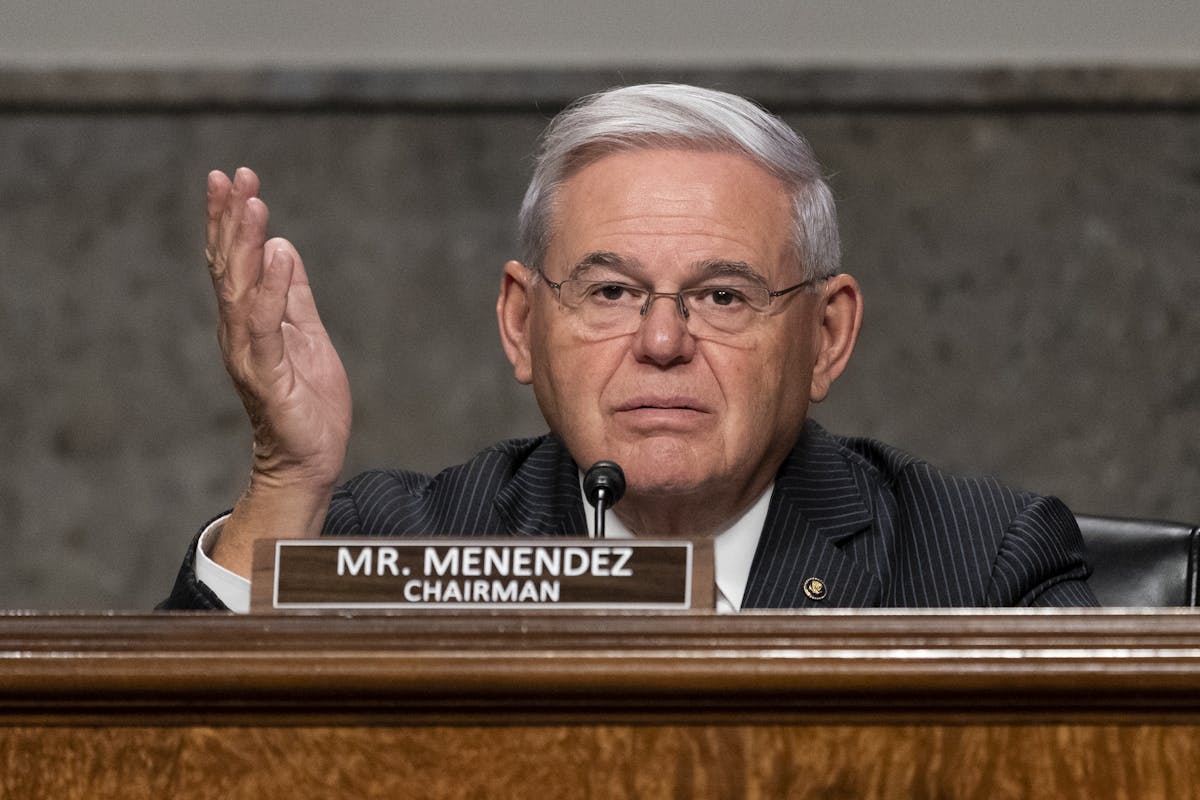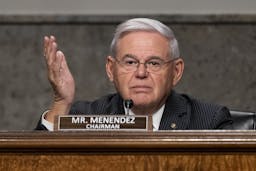After Scathing Attack on the Iran Deal, Will Menendez Hold Public Hearings?
A little-known, unelected bureaucrat is negotiating to revive President Obama’s article’s of appeasement with Iran.

As Capitol Hill’s most senior elected official on foreign policy loudly protests, a little-known, unelected bureaucrat is negotiating to revive President Obama’s article’s of appeasement with Iran.
The chairman of the Senate Foreign Relations Committee, Robert Menendez of New Jersey — a Democrat — delivered a scathing critique Tuesday of the negotiations in Vienna to revive the 2015 nuclear deal known as the Joint Comprehensive Plan of Action. He called instead for renewed pressure on Iran.
In Vienna, meanwhile, President Biden’s Iran point man, Robert Malley, is conducting months-long, highly secretive negotiations alongside colleagues from other JCPOA member countries. Three of Mr. Malley’s underlings have recently resigned, or — as the State Department would have it — were “reassigned.” None of the three made public their reported disagreement with Mr. Malley’s negotiation tactics.
Although Iran refuses to negotiate directly with the Americans, it seeks to reduce economic sanctions that were tightened under President Trump. Even as Washington’s relations with Moscow are at a low ebb, Russia, an Iranian ally, is helping Mr. Malley’s efforts to breathe life into the old agreement.
Will Mr. Menendez’s call to revive the largely dormant debate over those efforts bring the efforts to a halt? Several sources in Washington tell me that Mr. Malley is only lightly supervised by Secretary of State Blinken and Mr. Biden. Both have allowed their Iran-friendly negotiator much leeway to push forward.
Mr. Menendez was widely applauded by JCPOA detractors, but few believe his speech would change much at this point. “I don’t think it moves the needle,” said a senior Senate staffer. “Malley is allowed to do whatever he wants to do, and he will do whatever he can.”
Back in 2015, Mr. Menendez joined Republican colleagues, as well as such fellow Democrats as Senators Schumer and Manchin, in opposition to the pending deal. Facing insufficient support, President Obama therefore shrank from offering the deal for Senate approval, as was done in past disarmament agreements.
Instead, Mr. Obama, along with three European countries and Communist China and Russia, made the deal with the rulers at Tehran. The mullahs also stopped short of offering the deal for approval at the legislature, the Majlis. There, any negotiations with the Great Satan are unpopular. As no side signed or ratified it, the JCPOA remained, as the acronym suggests, a mere presidential-level plan of action.
The only legal stamp of approval came from the United Nations Security Council, which passed a resolution endorsing the JCPOA. In 2018 Mr. Trump withdrew from the deal. Mr. Biden announced his intention to renew the JCPOA . While Iran stalled after electing a hardliner president, Washington all but begged to revive the Vienna diplomacy, which resumed in November. Since then, only a trickle of hard news emerged from Vienna, where another round of talks resumed this week.
“At this point, we seriously have to ask what exactly are we trying to salvage?” Senator Menendez asked on the Senate floor Tuesday. After detailing the many flaws of the original JCPOA and reviewing Iran’s current nuclear advancement and its growing abilities to bypass existing sanctions, Mr. Menendez added: “I’m calling on the Biden administration and our international partners to exert more pressure on Iran to counter its nuclear program, its missile program, and its dangerous behavior around the Middle East, including attacks on American personnel and assets.”
At the same time, some American officials leaned toward a Russian proposal of an interim agreement. Far from a “longer and stronger” Iran deal, as Mr. Blinken promised during his Senate confirmation last year, Moscow’s proposal would temporarily lift some Iran sanctions in return for some nuclear restrictions. In other words, it would be shorter and weaker.
At the height of Washington current tensions with Moscow over Ukraine, Mr. Blinken met his Russian counterpart, Foreign Minister Sergei Lavrov. They didn’t agree on much, but after listening to Moscow’s Iran ideas, Mr. Blinken said the Vienna talks have reached a “decisive moment.” He added, “there’s still a window, a brief one, to bring those talks to a successful conclusion.”
How brief? “If a deal is not reached in the next few weeks, Iran’s ongoing nuclear advances will make it impossible to return to the JCPOA,” Mr. Blinken said.
That was nearly two weeks ago. Since at least the resumption of talks in November, Biden officials have publicly stated, darkly insinuated, and endlessly leaked to the press that same line about a “few weeks.” The Vienna talks, these officials forever repeat, must conclude within a short time, or else. Except the “else” never materializes while Mr. Malley pushes on.
Tonight Mr. Menendez announced he’d summon Mr. Malley to a closed-door hearing with the Senate committee. He should also invite Richard Nephew, Arianne Tabatabai, and the third negotiator who resigned the negotiation team after disagreement with Mr. Malley. And those hearing should be made public, for all Americans to know what’s negotiated on our behalf
________
Twitter @bennyavni

